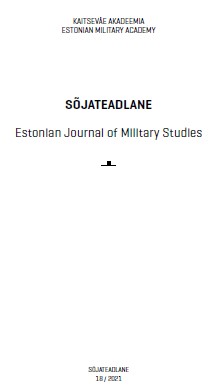MOTIVATSIOONILISED TUNNUSED AJATEENIJATE VÄLJAÕPPES NING NENDE SEOS ÕPITULEMUSTE JA ENNE TÄHTAEGA RESERVI ARVAMISEGA
MOTIVATIONAL ASPECTS IN CONSCRIPT TRAINING AND THEIR IMPACT ON RELEVANT OUTCOMES AND ATTRITION
Author(s): Mario Lementa, Ülle Säälik, Aivar Ots, Inga KartonSubject(s): Security and defense, Psychology of Self
Published by: Kaitseväe Akadeemia (KVA)
Keywords: perception of autonomy; self-efficacy; appreciation of training; drop-out intention; conscripts; learning outcomes; attrition;
Summary/Abstract: The objective of this study is to longitudinally explain the coherence between a perception of autonomy, self-efficacy, appreciation of training and desire to quit, as well as the ways in which these motivational aspects affect learning outcomes and early inclusion in the reserve forces in the course of a soldiers’ basic course. The study was conducted in 2019 in the Kuperjanov Infantry Battalion; data was gathered from 321 conscripts twice during the soldiers’ basic course; the average age of respondents was 19.9 years, whereas 1.56% of them were female. The motivational aspects perceived during training were determined with an electronic questionnaire and the learning outcomes were determined according to the results of the soldiers’ basic course exam; the proportion of conscripts leaving the service ahead of time was an indication of the attrition rate according to the administrative data. Analysis was conducted with Structural Equation Modelling method, including Cross Lagged Panel Model and Mediation Analysis. The hypotheses of the study were, to a large extent, confirmed: conscripts’ perception of autonomy positively influenced their self-efficacy and negatively their intention to quit. Moreover, a greater perception of autonomy is positively related with the training outcomes of conscripts and negatively with an early inclusion in the reserve forces. Autonomy perceived earlier in the training, however, was not related with a subsequent appreciation of training. The study has some constraints such as a limited generalisation of the results in the example of a single unit or an exclusion of other potential aspects (learning environment or other) that might have an impact. Despite the constraints, the results of the study are valuable since they provide new knowledge about the validity of general education findings in the context of military training of conscripts in the Estonian Defence Forces.
Journal: Sõjateadlane
- Issue Year: 2021
- Issue No: 18
- Page Range: 47-85
- Page Count: 39
- Language: Estonian

